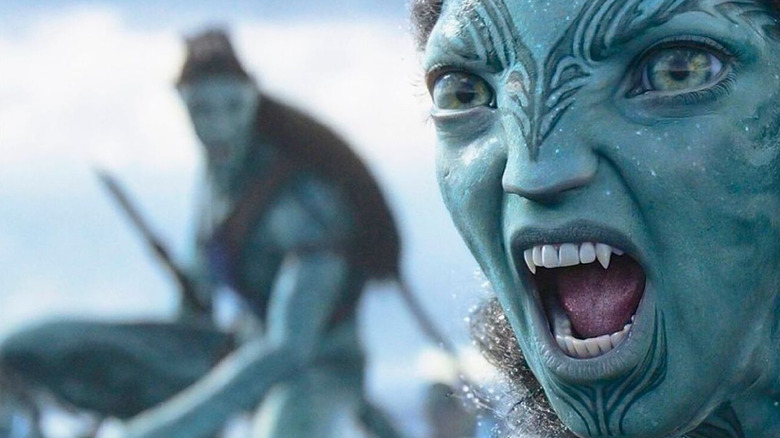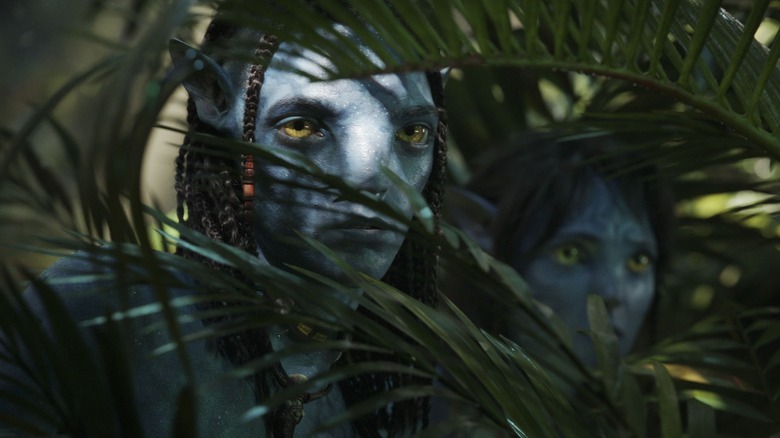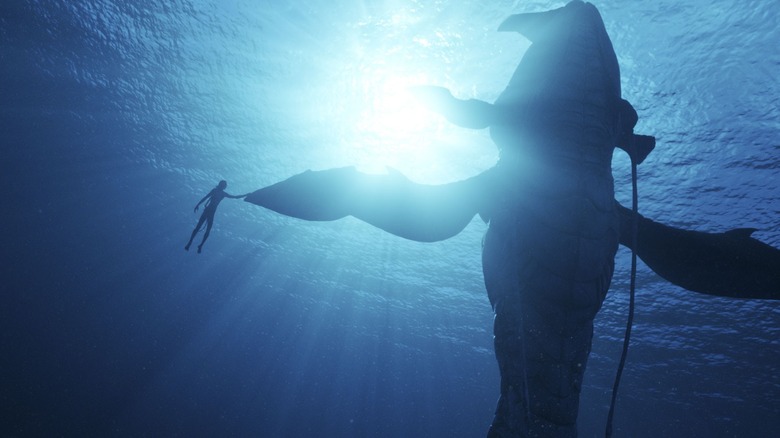Avatar: The Way Of Water Is The Perfect Antidote To The Modern Blockbuster
Over the course of the last two years, many stories have been breaking about the way Marvel Studios treats their special effects technicians. With films as visually elaborate and requiring as much FX as the ones seen the Marvel Cinematic Universe, many, many out-of-house production companies are being hired to complete a great deal of digital animation in very little time. In a report in The Guardian back in August, many VFX technicians stepped forward to describe Marvel as demanding and overwhelming, often making big changes at the last minute. These concerns were brought up again just recently with the release of "She-Hulk: Attorney at Law," a series that features a lead character who is often realized through motion capture technology. And this isn't new. A lawsuit in 2020 saw Disney facing accusations of potential of stolen VFX tech.
The frustrating aspect of these controversies for audiences is that, after all that rush and all those demands, the MCU movies all end up looking bland, rushed, and kind of the same. The MCU is galling in that regard. In their (to date) 30-film cycle, there have been magical wizard movies, down-to-Earth teen comedies, rollicking space adventures, Norse god melodramas, spy thrillers, and tales of the ancient world. And yet, despite a few exceptions, they mostly all feel the same. There are tonal similarities throughout that makes an ever-expanding universe feel incredibly limited in its scope. As the MCU is predicated almost entirely on its potential for character crossovers, there must necessarily be a "house style" at play, ensuring no character feels too far afield from another. This is a universe where the Eternals might meet Howard the Duck.
Rejecting the house aesthetic
With director James Cameron's new sequel "Avatar: The Way of Water" now playing in theaters, the filmmakers involved have all been working together on a singular aesthetic for 13 years. The first "Avatar" was released in 2009, and Cameron has famously been waiting for VFX technology to advance to the point of matching the director's vision. Cameron sought to make a singular, visual spectacular, using underwater photography, specially re-worked high frame rates, and extensive motion capture tech, "The Way of Water" is one of those rare, rare features to potentially earn the overused critic's descriptor "visually stunning."
The two "Avatar" movies are unique in blockbuster filmmaking in that their director has affected the philosophy of "why make a movie unless it will be the biggest of all time?" Cameron, rather than rely on long-recognizable characters, carefully orchestrated press releases, interconnected cinematic universes, or other marketing-forward elements of the modern blockbuster cycle, has elected to focus on advancing film visuals as far as her personally could.
Over the years, many, many articles have been written about how the first "Avatar," despite being the highest-grossing film of all time, left no significant cultural imprint. Many argued that when it came to commercialized iconography, catchphrases, and frequently distributed merchandise, "Avatar" fell way behind its brethren in the "Star Wars" and Marvel universes. Few people, for instance, would dress up as a Na'vi for Halloween, or order an "Avatar" ice cream cake. Meanwhile, Darth Vader will still show up to drink pumpkin beer every October. "Avatar," the argument seemed to be, had no Darth Vader character, no "I am your father" moment, and no pervasive toy product to keep it perpetually entrenched in the pop consciousness.
Addicted to marketing
The idea that "Avatar" has "left no cultural impact" is, however, churlish, and stems from a too-pervasive notion that the cinematic free market is going to be the ultimate arbiter of any sociological presence. True, we may not be quoting lines of dialogue from "Avatar" around the office the same way we might quote "Ghostbusters," but that only reveals 1) that "Avatar" has a screenplay free of bon-mots, and 2) That "Ghostbusters" was made commercially available for years, its dialogue and iconography regularly appearing on t-shirts. Sometimes catchphrases catch on organically. Often, they are held onto as perpetual advertising slogans.
Both "Avatar" films, while infused with the usual marketing blitz that accompanies any film of their size, is not specifically targeting a reliable geek audience the way Disney is so keen on doing. It is, instead, selling itself on the power of its visuals, and the beatific feeling an audience may have in visiting Pandora. Over the last 20 years or so, film marketing has become increasingly insidious, to the point where audiences are carefully trained to anticipate blockbusters in a certain way.
The modern anticipation economy is not absent from "The Way of Water," of course, and one has been seeing ads for it going back a year. But "Water" is mercifully missing a broad sense that it will connect to a highly commercialized, extant film and TV franchise. Because MCU and "Star Wars" movies gain a lot of their individual traction from their part in a massive, cross-media supernarrative, any film that comes packages without said connect is now suspect.
The old school
"It wasn't memorable" is just a way to say that "Avatar" wasn't marketed as aggressively and constantly as Marvel. It wasn't part of every aspect of our lives. It wasn't given constant noisy reminders that products are available. It — horror of horrors — stood on its own merits. "The Way of Water" is only the second "Avatar" film in 13 years. It's bright, dazzling, and visually new in a way most blockbusters aren't. It is also, perhaps unusually, being sold as a singular experience. Skipping "The Way of Water" will mean only that you miss "The Way of Water." It doesn't mean you'll miss plot details as they pertain to an unrelated sequel set somewhere else on Pandora.
These, I acknowledge, are strange sentiments to apply to a director like James Cameron, one of the most commercially gigantic filmmakers working. He is certainly no scrappy underdog fighting the Marvel machine. His films don't require sympathy or support. But it should be noted that Cameron is trying to bring effect-based blockbusters back to the '80s and '90s, when it was the film itself being sold, and not a cinematic universe, a house style, or a vague sense of nerdy completism. Cameron, for all his many, many flaws as a filmmaker — his screenwriting skills leave a heck of a lot to be desired — is still a master of a certain kind of pop filmmaking that is, despite its flaws, incredibly effective.
In a cinematic landscape buoyed by only a few particular types of blockbusters, it's refreshing to see a filmmaker with the money and the wherewithal to making something look new and exciting. Time will tell if audiences actually respond, or if "Water," too, will become a gigantic film "no one remembers."



